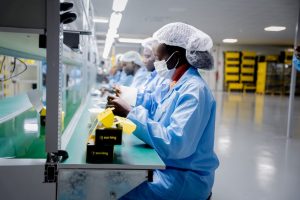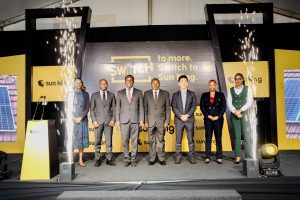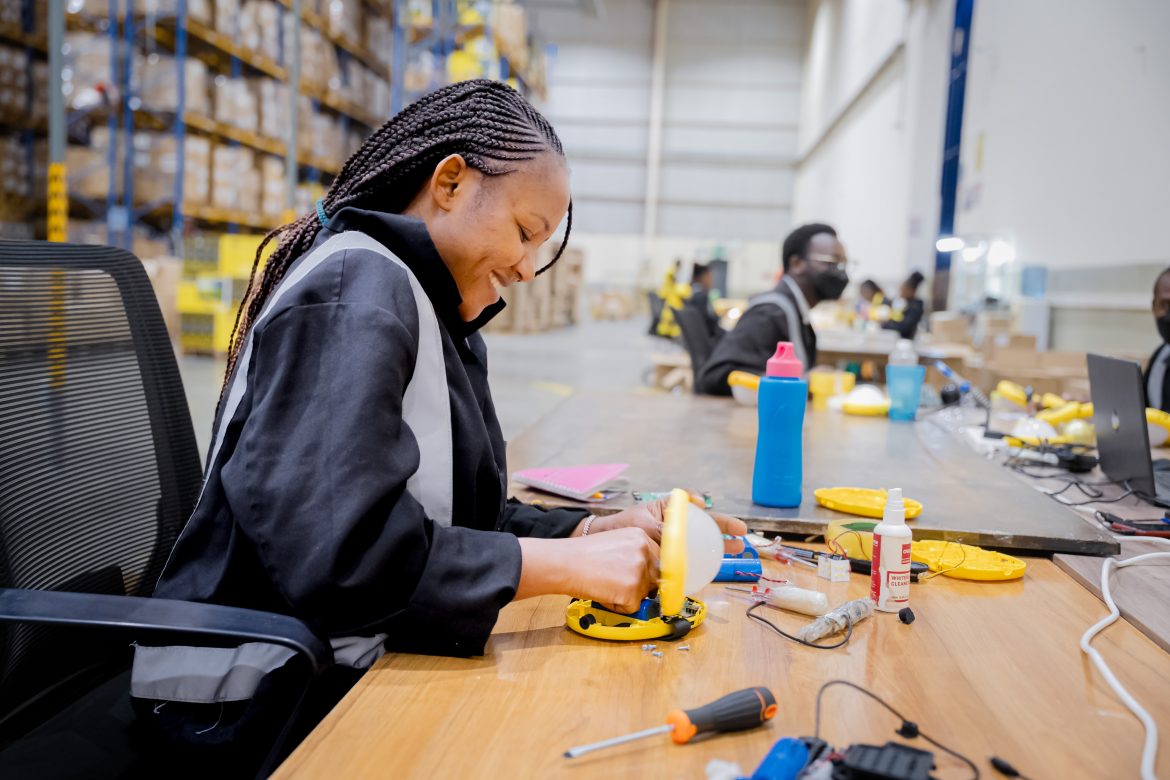When 24-year-old production line worker steps onto the floor of Sun King’s gleaming new factory in Tatu City each morning, she’s part of something bigger than assembling solar-powered televisions and smartphones. She’s among the first generation of Kenyans building Africa’s renewable energy hardware—not just selling or installing it.
On Friday, Sun King inaugurated its first African manufacturing facility, a 7,600-square-meter hub that will churn out up to 700,000 solar products annually. But beyond the production numbers and the high-profile ribbon-cutting attended by senior government officials, the real story is who’s doing the building: 90 employees, 40 percent of them women, with the workforce set to quadruple to 350 within five years.
The timing couldn’t be more critical. Youth unemployment remains stubbornly high in Kenya, even as the country pushes an ambitious industrialization agenda under Vision 2030. Sun King’s facility offers a glimpse of what that future could look like—young Kenyans gaining technical skills in manufacturing jobs that didn’t exist here a year ago.

From Imports to “Made in Kenya”
For over a decade, Sun King has been Kenya’s solar success story. Today, one in five Kenyan households uses a Sun King product—solar kits powering homes for the first time, energy-efficient refrigerators keeping medicines cold in rural clinics, televisions bringing connectivity to off-grid communities.
But until now, nearly everything was imported. That changes with Tatu City.
“By producing locally, we’re reducing import dependencies, we’re shortening supply chains, and ensuring that more of the value created within this industry stays right here in Kenya,” Kota Kojima, Sun King’s Chief Operating Officer, told guests at the launch. “Over the next five years, this facility alone has the potential to replace over $150 million in imports.”
The facility consolidates three operations under one roof: manufacturing solar-powered TVs and smartphones, refurbishing used solar systems to extend their lifespan, and warehousing products for distribution across East Africa. Starting with consumer electronics makes strategic sense—these are high-volume products where local assembly can meaningfully cut costs and delivery times.
But Kojima hinted at bigger ambitions. The company is “actively investigating how to expand into additional product lines,” exploring how Kenya’s growing industrial ecosystem can support manufacturing more complex solar components locally.
Building Skills, Not Just Products
What excites Kenya’s industrial planners isn’t just the jobs—it’s the skills transfer.
Naomi Makena, Sun King’s Head of Operations for Africa, emphasized that the facility is creating “careers, not just jobs.” Kenyan engineers, technicians, data analysts, quality controllers, and machine operators are learning manufacturing processes that can translate across industries.
Sun King plans to partner with the National Industrial Training Authority (NITA) and local universities to offer structured internships and apprenticeships. High-performing trainees will have pathways to full-time roles—a model that could address Kenya’s persistent skills mismatch between what universities teach and what industry needs.
“Kenya has the policy vision, the talent, and the drive to lead this transformation,” said Dr. Wale Aboyade, Sun King’s Senior Vice President for Public Policy and Government Relations. “We’re proud to play our part in turning that potential into lasting industrial growth.”
For government officials present at the launch, the message resonated. “This milestone is a symbol of growing confidence in Kenya’s local manufacturing,” said Dr. Juma Mukhwana, Principal Secretary in the State Department of Industry. “This is very much in line with the Kenyan Government’s agenda, such as the Bottom-Up Economic Transformation Agenda.”
The Circular Economy Angle
Beyond manufacturing new products, Sun King is making a big bet on something less glamorous but potentially more impactful: refurbishment and recycling.
Daisy Mugambi, the company’s After-Sales Manager for Kenya, explained that the facility will refurbish nearly 100,000 used solar appliances annually, giving them “a second life.” With 150 collection shops across Kenya, customers can drop off defective units for repair and certified refurbishment rather than discarding them.
“We are not only able to increase our production in Kenya, but we’ve also set a new standard for circular economy practice,” Mugambi said. The refurbishment operation—described as one-of-a-kind in Africa—partners with recycling agencies to safely process waste and recover valuable materials.
For customers, this means more affordable repair services. For Kenya, it means less electronic waste ending up in landfills and more skilled jobs in logistics and repair. And for Sun King, it’s smart economics: extending product life reduces costs, strengthens supply chains, and builds customer loyalty.
The approach aligns with Kenya’s Vision 2030 goals and emerging circular economy strategy, positioning the country as a potential leader in responsible electronics manufacturing on the continent.
 What’s Next
What’s Next
Sun King’s Kenyan operation is already massive: nearly 10,000 employees nationwide, installing 100,000 solar kits monthly just in Kenya (330,000 across Africa). The company serves more than 25 million families continent-wide.
The Tatu City facility represents something different—a shift from distribution and installation to actual production. If successful, it could serve as a template for other renewable energy companies looking to localize manufacturing in Africa rather than shipping everything from Asia.
For Kenya’s policymakers betting on industrialization to drive economic growth, Sun King offers validation. The company chose Kenya deliberately, citing “progressive industrial and energy policies” that made long-term investment feasible.
The question now is whether this sparks a broader manufacturing revival—or remains an isolated bright spot. The 350 jobs expected within five years would be significant, but Kenya needs tens of thousands of such opportunities to meaningfully dent youth unemployment.
Still, every industrial transformation starts somewhere. And for 90 young Kenyans showing up to work at Tatu City, that somewhere is now.

